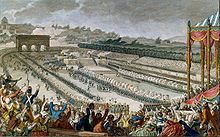The day of glory has arrived!
Against us of the tyranny
The bloody banner is raised,
The bloody banner is raised,
Do you hear, in the countryside,
The roar of those ferocious soldiers?
They’re coming right into your arms
To slit the throats your sons and your companions!
Chorus
To arms, citizens,
Form your battalions,
Let’s march, let’s march!
That tainted blood
Water our furrows!
What does this horde of slaves,
Of traitors and conjured kings want?
For whom are these vile chains,
These long-prepared irons?
These long-prepared irons?
Frenchmen, for us, ah! What outrage
What fury it must arouse!
It is us they dare plan
To return to the old slavery!
Aux armes, citoyens…
What! Foreign cohorts
Would make the law in our homes!
What! These mercenary phalanxes
Would strike down our proud warriors!
Would strike down our proud warriors!
Great God ! By chained hands
Our brows would yield under the yoke
Vile despots would have themselves
The masters of our destinies!
Aux armes, citoyens…
Tremble, tyrants and you traitors
The shame of all parties,
Tremble! Your parricidal schemes
Will finally receive their reward!
Will finally receive their reward!
Everyone is a soldier to combat you
If they fall, our young heroes,
The earth will produce new ones,
Ready to fight against you!
Aux armes, citoyens…
Frenchmen, as magnanimous warriors,
You bear or hold back your blows!
You spare those sorry victims,
Who arm against us with regret.
Who arm against us with regret.
But not these bloodthirsty despots,
These accomplices of Bouillé,
All these tigers who, mercilessly,
Rip their mother’s breast!
Aux armes, citoyens…
Sacred love of the Fatherland,
Lead, support our avenging arms
Liberty, cherished Liberty,
Fight with thy defenders!
Fight with thy defenders!
Under our flags, shall victory
Hurry to thy manly accents,
That thy expiring enemies,
See thy triumph and our glory!
Aux armes, citoyens…
(Children’s Verse)
We shall enter in the (military) career
When our elders are no longer there,
There we shall find their dust
And the trace of their virtues
And the trace of their virtues
Much less jealous to survive them
Than to share their coffins,
We shall have the sublime pride
Of avenging or following them
Aux armes, citoyens…



 There was a gleam of hope this week for state officials faced with the prospects of having to start delaying projects and lay off people working on maintenance and new construction funded from the Federal Highway Fund:
There was a gleam of hope this week for state officials faced with the prospects of having to start delaying projects and lay off people working on maintenance and new construction funded from the Federal Highway Fund:
Recent Comments